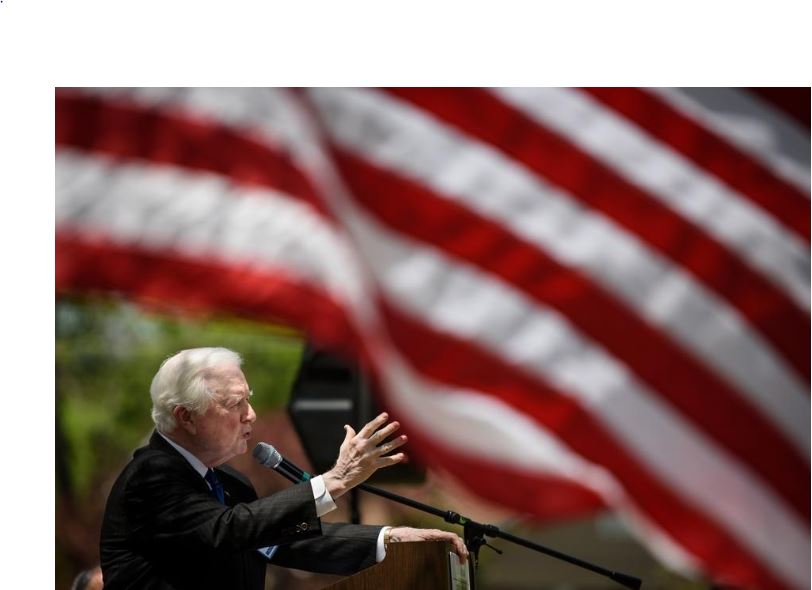NORTH CAROLINA: Ground Broken on $65M Civil War History Center
FAYETTEVILLE, N.C.: Ground was ceremonially broken in Fayetteville on Wednesday for a $65 million museum complex dedicated to the Civil War era, the most divided period in American history.

Former Gov. Jim Hunt speaks at the groundbreaking ceremony for the first phase of the North Carolina Civil War and Reconstruction History Center.
Participants at the event said they hope the complex will be an educational resource and help heal racial and cultural divides that persist in the United States more than 150 years after the war ended.
The North Carolina Civil War & Reconstruction History Center is to be built next to the remnants of a Confederate Army arsenal on Arsenal Avenue on Haymount Hill. So far, organizers have obtained $27 million in government commitments and private donations to pay for it. They plan to ask the state, which has contributed $5 million, for another $25 million.
Backers say the history center will be a nexus of knowledge about the 1861 to 1865 failed rebellion of the Southern states. And it will cover the Reconstruction Era, a difficult period immediately after the war when the United States government brought the former Confederate states back into the union and approximately 4 million newly freed slaves into American citizenship and society.
The first phase involves rehabilitating and moving three historic buildings on the property to form a “village,” said Mac Healy, the president of the North Carolina Civil War & Reconstruction History Center Foundation.
One will be a support center, and one will be a digital education center for distance learning, Healy said. The third will be a center for the study of the the Civil War and Reconstruction period, Healy said, run in partnership with Fayetteville State, UNC Pembroke and UNC Wilmington.
A picnic pavilion is also to be built.
Healy hopes to complete the first phase and open to the public in the next 12 months.
Organizers hope the second phase, which is to include a 60,000-square-foot museum building, can start construction in 2020 and open a few years after. The new museum building will replace the Museum of the Cape Fear, a small history museum on the site that opened in 1987.
On Wednesday, the bitter divide from 150 years ago still cast its shadow as 14 dignitaries used 14 gold-colored shovels to heave scoops of dirt into the air to mark the first phase of the complex’s construction. More than 300 turned out for the occasion.
State Rep. Elmer Floyd, a black Fayetteville legislator who did not attend the ceremony, later described Fayetteville’s black residents as lukewarm toward the project. They question government support for the Civil War complex while their neighborhoods lag economically and some just outside the city are prevented from being annexed into the city to obtain basic amenities like sewer service.
Speakers at the groundbreaking recognized that many black Americans would have little enthusiasm for something they perceive as a monument to a war waged to keep their ancestors in slavery.
“Standing as the second African-American mayor of our city in over 250 years, this was a difficult project for me to embrace initially,” said Fayetteville Mayor Mitch Colvin. Nearly 160 years ago, Colvin said, his grandmother’s grandfather and other relatives were sold at the Market House in downtown Fayetteville.
Colvin said he told the History Center’s board of directors that “the Civil War is not a pleasant time for me and my community and my family personally.” The board told him the project will tell the full story of the war and its aftermath, Colvin said. He found that encouraging.
Now Fayetteville’s City Council members, the Cumberland County commissioners and the county’s state lawmakers “have the obligation to educate our community, to educate our constituents, to let them know that is something that will bring us together, not to increase our divide,” Colvin said.
The History Center will create opportunities for empathy among people, said Chancellor James Anderson of historically black Fayetteville State.
The Black Lives Matter movement arose because in the United States, many people “don’t understand they never mattered. The Market House tells you: They never mattered,” Anderson said. Now, “it’s OK to just shoot down innocent black men, because it never mattered back then.
“By the same token, we African-Americans have to understand that there are whites who support and honor the death of their loved ones during the Confederacy,” Anderson said. “I can have different feelings about the Confederacy, but I can still empathize with the death of a loved one.”
The groundbreaking included two former governors: Jim Hunt and Jim Martin. They are the honorary chairman of the history center’s board of advisors.
Hunt said when he was growing up, he was never taught details about the Civil War and Reconstruction.
“Nobody told me the story, and I should have known it,” Hunt said.
“You need to know about the Civil War. You need to know about Reconstruction — the real facts, how African-Americans were treated after that war,” Hunt said. “Not good here; even worse through the deep South.”
The History Center must focus on facts and tell the story fairly and completely, Martin said.
“It must be our commitment and our private prayer that this facility, its staff, the research that’s done here, the collection of exhibits, the community programs, the interaction with others across the state and across the nation, will, to the best of our ability, be an instrument of healing through our part of a divided country,” Martin said.
–fayobserver.com
###


